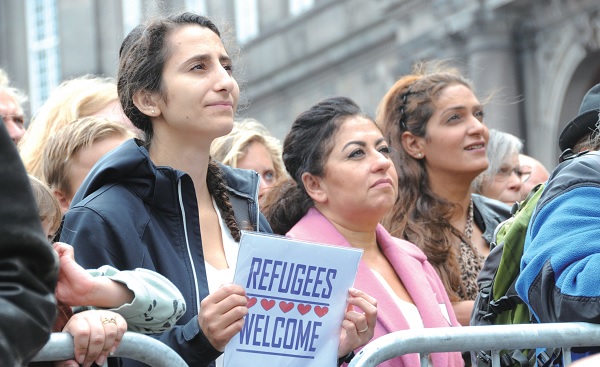Caring for the Displaced and Migrants
Translated by Zhang Jun
Jesus Himself Was a Foreigner
The calling and work of Christians must be grounded in an understanding of the Bible, which dictates what and how we should serve. We are all made in God's image, and ultimately, we are sojourners in this world. Jesus' ministry on Earth reflected His care for the marginalized, and God calls us—both as individuals and organizations—to care for the poor and oppressed, including those displaced for various reasons. This article invites readers to reflect on how God views this vulnerable group of people.
At creation, God made humans in His image, affirming their inherent dignity and worth. This should shape how we view others, regardless of their social or political standing. Our identity as God's image-bearers defines not only our relationships but also our purpose in ministry. This understanding of service is clearly demonstrated through Jesus' incarnation and His ministry.
Christ's incarnation brings dignity and unity to migrants and the displaced. Through Jesus, God entered humanity's brokenness to guide those lost in eternal wandering and restore a complete relationship with Him. God's descent makes man's ascent to God possible.
The Gospels are rich with stories of migration and displacement. In Matthew 2, Jesus and His family fled as political refugees. In John 7, many rejected Jesus based on His origin. Luke 9:58 highlights Jesus’ transient, constantly migrating life throughout His ministry.
The unity between God and humanity is so complete that God not only extends help to strangers but also becomes one of them. Christ's union with humanity, His death, and eventual resurrection proclaim freedom for captives. This is the result of the incarnation—everyone deserves Christ and should receive dignity, peace, and justice. Jesus exemplifies true humanity, serving as a model for all, as God's people are sojourners on Earth.
From the expulsion from Eden in Genesis to the vision of the Holy City revealed to the exiled John in Revelation, the Bible is rich with themes of displacement and migration. The Hebrew Bible consistently portrays a wandering people seeking a homeland; God's chosen ones are repeatedly exiled to different kingdoms and lands.
The temporary identity of God's people is expanded in the New Testament; Paul explains that our primary identity is as citizens of God's kingdom and family, serving as His ambassadors in foreign lands committed to the ministry of reconciliation. Even as sojourners in this world, we are called to love and compassion, welcoming strangers among us.
The Old Testament law states that settled residents must not oppress or exploit foreigners, as we are all strangers. Both the Old and New Testaments emphasize God's directive for His people to welcome strangers into their communities, build bridges of peace, and practice hospitality, showcasing God's holistic concern for the poor and oppressed.
God's deep concern calls us to see and serve the most vulnerable, including those forced to migrate and face significant risks. God has always stood with the poor and oppressed, hearing the cries of the "sojourners, widows, and orphans." Jesus said that neglecting "the least of these"—the hungry, the homeless, the sick, and the imprisoned—is akin to neglecting Christ Himself.
The journey of displacement, whether by necessity or force, puts individuals in danger. God urges us to support and assist these individuals, not only through personal care but also by engaging with the broader systems around us. We are called to acknowledge our participation in and benefits from the injustices that oppress immigrants and create displacement. We are also called to renew our minds and, through Jesus Christ and the cross, become new creations. Christians should maintain a vigilant attitude toward the systems and policies that lead to displacement and drive vulnerable populations to migrate. Just as the church must recognize and address challenges such as racism, poverty, and militarism, we are also called to confess, accept responsibility, and promote justice and peace through faithful living and public witness regarding immigrants and the displaced.

Challenges and Needs in the Refugee Resettlement Process
When discussing refugees, it's crucial to understand the definition of "refugee." There isn't a universally accepted definition among countries, but a widely accepted one, such as the United Nations' legal definition, refers to individuals who cross borders to escape war, violence, conflict, or persecution. The key term is "persecution," meaning that someone must be actively pursuing them for them to be considered refugees.
For instance, after the outbreak of the Russia-Ukraine war in 2022, many Ukrainians fled across borders. Similarly, individuals displaced by the Syrian conflict or Afghans after the Taliban's resurgence also fit this definition. However, those displaced but unable to cross borders may not be classified as refugees. Additionally, people forced to leave their homes, such as those in Bangladesh who have lost their land to rising seas due to climate change, also face challenges. While definitions and legal agreements imply that nations have obligations to provide rights and benefits to such populations, there will always be individuals who fall outside these definitions and thus cannot receive assistance.
The current global refugee total is primarily based on statistics from before the Ukraine crisis. This number can be increased by about 6 million due to the conflict. Overall, there are approximately 84 million individuals who meet the legal definition of refugees, with two-thirds originating from just five countries.
Currently, most refugees do not come from the poorest countries but rather from those with moderate economic conditions, many facing some form of conflict. Nearly 90% of refugees are hosted by middle-income countries outside of Western Europe, the U.S., and Canada, with most hosted by neighboring or less stable countries. In contrast, the U.S. has not accepted as many refugees on the international stage, with nearly half of those accepted being under 18 years old.
In 2021, only 126,000 refugees were resettled or returned to their home countries, which is less than 0.2% of the total refugee population.
Due to the different definitions and conditions of refugee status in various countries, I prefer to use the term "forcibly displaced" to describe their situation. "Refugee" refers to a legal status, similar to types of visas, which doesn't accurately represent the entire population.
The U.S. refugee resettlement process involves three basic steps. The first step is to undergo processing to determine eligibility for refugee status, which is often the most time-consuming phase, typically taking several years. I've encountered teenagers born in refugee camps who have been refugees their entire lives. Many forcibly displaced individuals live in camps or settlements coordinated by organizations like international relief agencies or the United Nations International Organization for Migration, which can also handle the initial processing.
In the U.S., organizations work with the State Department to conduct background checks on individuals seeking refugee status. For a few accepted, the presence of relatives in the U.S. is also considered. Refugees must have an organization to sponsor them, with about 12 approved resettlement organizations. These organizations help find housing, assist with employment, and connect refugees with the local community. The ideal situation is resettlement in areas with community ties.
The second step involves traveling to the resettlement agency, often larger NGOs like the International Rescue Committee, which manage immediate housing arrangements for refugees.
The final step is integration, which helps refugees establish a thriving life in their new communities. Key needs include housing and English language courses, as language skills are essential for local integration. Many forcibly displaced individuals may have received higher education but lack documentation due to their abrupt escape, leading them to start from the bottom in low-wage jobs. Additionally, children often face cultural shocks, making the integration process slow and challenging.
Expanding the table and Enjoying Abundance
There are many ways to provide help, with the most important being to connect with local resettlement agencies that understand the refugee process and their specific needs. Regular communication with these agencies can reveal various ways to assist, such as providing housing or coordinating clothing donations for refugees from warmer climates.
Additionally, they often need help navigating local school systems and English language support. Personal experiences, such as helping a refugee family from Iran with ESL classes, highlight the challenges of dealing with bureaucratic systems and the need for effective communication in these situations.
It's important for well-meaning individuals not to seek out a family to help without first receiving training through a resettlement agency. Cultural differences can lead to misunderstandings; for example, in Middle Eastern cultures, men and women should not be alone together, and there are specific rules about handshakes.
There are many ways to fund refugee assistance, but providing direct financial help might not be the best approach. Money can be complicated, and it's advisable to go through an agency for greater transparency.
Additionally, it's important to recognize that first-time visitors to the U.S. may not understand many aspects of life here and are often unfamiliar with various systems, which places them in a more vulnerable position. These differences can influence how they perceive their helpers and shape the interactions between both parties.
Remember, God does not distinguish between refugees and foreigners. Our mindset should transcend the model of who qualifies as a legal refugee. The reasons for fleeing are often not a matter of choice, and legal definitions can be vague, leading to artificial distinctions.
There is no clear line between those who are forced to leave and those who choose to leave. Some may flee due to gang violence, while others seek better economic opportunities for their children. As Christians, we must refrain from valuing individuals based on their circumstances, recognizing that all people deserve love, regardless of their situations. Everyone's journey and motivations are complex, and it's essential to approach these issues with compassion and understanding.

By examining the Old Testament practices, such as the Year of Jubilee and the customs of hospitality, we understand that all individuals, regardless of their identity or visa status, deserve equal treatment. It's essential to offer assistance to everyone, not just those from friendly nations, as many are victims of their circumstances.
May Christ’s disciples embody God’s compassion for the displaced through actionable love, extending our tables to invite refugees, immigrants, and sojourners to partake in the abundance God offers.
is currently working at the Airbel Impact Lab of the International Rescue Committee, which is a large NGO dedicated to helping people facing humanitarian crises to survive, recover, and rebuild their lives. He has worked in various countries for different NGOs and nonprofits, including serving as the UN representative for the Mennonite Central Committee and providing consulting for Catholic Relief Services as a cash group technical researcher. He has supported forcibly displaced populations in Bangladesh and Uganda and collaborated with small rural communities in Nepal and the Philippines. He lives in New York City with his wife, Grace Pyo.
Translator Bio: Zhang Jun is a mother of three who comes from a STEM background but is passionate about translation work. Once a homeschooler, she eagerly anticipates God's guidance as she embarks on a new journey in life!













